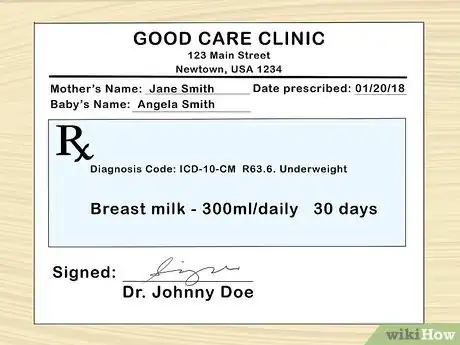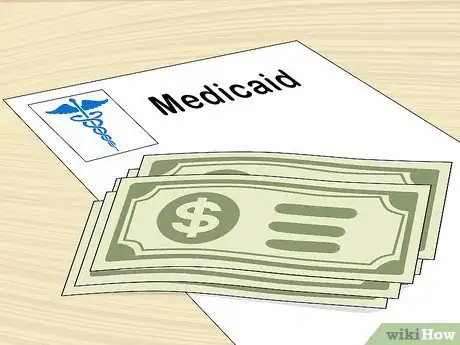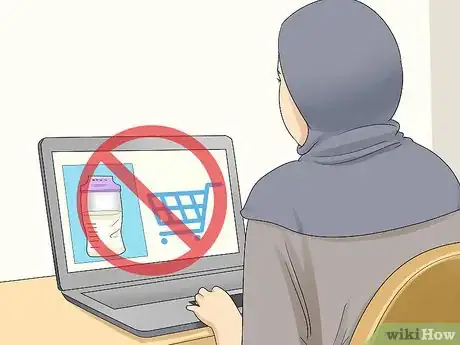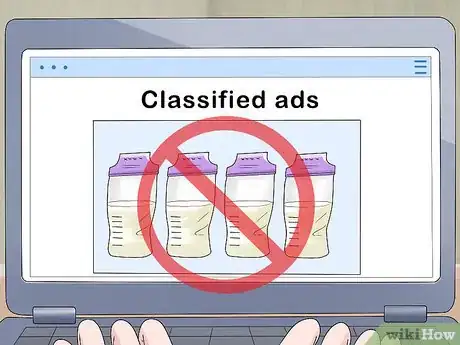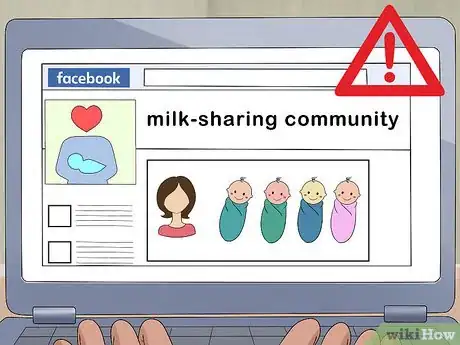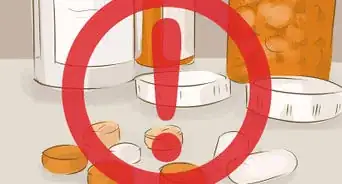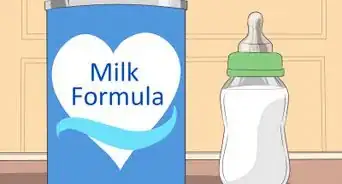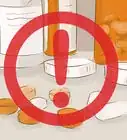This article was co-authored by Sarah Siebold, IBCLC, MA. Sarah Siebold is an International board certified Lactation Consultant (IBCLC) and Certified Lactation Educator Counselor (CLEC) based in Los Angeles, California. She runs her own lactation consulting practice called IMMA, where she specializes in emotional support, clinical care, and evidence-based breastfeeding practices. Her editorial work about new motherhood and breastfeeding has been featured in VoyageLA, The Tot, and Hello My Tribe. She completed her clinical lactation training in both private practice and outpatient settings through the University of California, San Diego. She also earned her M.A. in English and American Literature from New York University.
This article has been viewed 11,861 times.
Breast milk is the best way to provide easily digestible nutrients for your baby. If you can't breastfeed your child, ask your pediatrician about the possibility of purchasing milk. They can recommend a donor bank in your area that supplies breast milk to infants in need. It is always best to get pasteurized donor milk from approved milk banks to make sure that it is safe for your baby.
Steps
Buying Prescription Breast Milk
-
1Consult your child's pediatrician. Breast milk obtained from approved milk banks can be given directly to babies while they are still in the hospital, but there are steps you must take to procure it once they are released. If you wish to purchase breast milk after bringing your baby home, ask your child's pediatrician if they recommend it. The doctor may decide that donor milk is right for your baby if:[1]
- You are unable to provide breast milk for your child
- Your child has a life-threatening condition or weakened immune system
- Your child is underweight
- Your child has allergies
-
2Obtain a prescription from your baby's pediatrician. If your pediatrician agrees that your baby should receive donor breast milk, get a prescription from them. Verify that the prescription lists all the relevant information a milk bank will need to process your request. This information should include:
- Your baby's name and date of birth
- Your full name and contact information
- A diagnosis code or medical description of why the milk is needed
- The daily volume of milk that is required
- The duration of the prescription
- The doctor's name and contact information
Advertisement -
3Contact an approved milk bank recommended by your pediatrician. Ask your pediatrician to recommend a donor bank in the area and call or email them to find out their process for distributing milk. Reputable milk donor banks will be hospital-approved and have rigorous screening checks and a reliable pasteurization process. Ask about the availability of donor milk, which may be in short supply if the demand is high.
- Note that hospitalized infants are usually given priority when availability is low.
-
4Follow the milk bank's procedure for obtaining milk. Each milk bank will have its own regulations concerning the approval and distribution of milk to outpatient infants. If necessary, obtain an application form to submit with your prescription and fax, mail, or deliver it to the bank. Some milk banks may require you to open an account with them to keep track of your requirements and information.[2]
-
5Work out your payment plan. Even through non-profit milk banks, a processing fee is required to cover the costs of screening, pasteurization, and transport. Find out if this fee may be covered by your private health insurance company or by Medicaid. Purchasing milk from a non-profit bank will cost roughly $5 per ounce, which could add up to approximately $150 dollars a day.
Avoiding Dangers
-
1Never order breast milk online to avoid contamination. The FDA strictly discourages the purchase of breast milk from online sources because of the high risk of contamination. Any milk you obtain this way could transmit infectious diseases, traces of drugs, or bacteria. Avoid purchasing breast milk from the Internet no matter how reliable the seller may seem, as the risk is not worth it.[3]
-
2Do not use online classified ads to buy breast milk, which is risky. Sites like Craigslist are a good way to find services in your area, but they offer no means of screening or verifying the trustworthiness of sellers. While these sites technically forbid the sale of breast milk, sellers can often circumvent these rules to advertise it anyway.[4]
- Regardless of how genuine and wholesome someone selling their milk might seem in correspondence or in person, it is not worth the risk of contamination to your baby to make the purchase.
-
3Steer clear of milk-sharing communities, which do not enforce safety rules. There are a number of non-commercial groups online that promote the free sharing of breast milk between mothers. These communities, which can be found on specific websites or platforms like Facebook, offer guidelines to members but do not oversee or regulate the transfer of milk. Avoid joining these groups to obtain breast milk, as the chance of contamination could be significant.[5]
Expert Q&A
Did you know you can get expert answers for this article?
Unlock expert answers by supporting wikiHow
-
QuestionIs breastmilk better than formula?
 Sarah Siebold, IBCLC, MASarah Siebold is an International board certified Lactation Consultant (IBCLC) and Certified Lactation Educator Counselor (CLEC) based in Los Angeles, California. She runs her own lactation consulting practice called IMMA, where she specializes in emotional support, clinical care, and evidence-based breastfeeding practices. Her editorial work about new motherhood and breastfeeding has been featured in VoyageLA, The Tot, and Hello My Tribe. She completed her clinical lactation training in both private practice and outpatient settings through the University of California, San Diego. She also earned her M.A. in English and American Literature from New York University.
Sarah Siebold, IBCLC, MASarah Siebold is an International board certified Lactation Consultant (IBCLC) and Certified Lactation Educator Counselor (CLEC) based in Los Angeles, California. She runs her own lactation consulting practice called IMMA, where she specializes in emotional support, clinical care, and evidence-based breastfeeding practices. Her editorial work about new motherhood and breastfeeding has been featured in VoyageLA, The Tot, and Hello My Tribe. She completed her clinical lactation training in both private practice and outpatient settings through the University of California, San Diego. She also earned her M.A. in English and American Literature from New York University.
International Board Certified Lactation Consultant
-
QuestionHow long can refrigerated breast milk be out at room temperature?
 Sarah Siebold, IBCLC, MASarah Siebold is an International board certified Lactation Consultant (IBCLC) and Certified Lactation Educator Counselor (CLEC) based in Los Angeles, California. She runs her own lactation consulting practice called IMMA, where she specializes in emotional support, clinical care, and evidence-based breastfeeding practices. Her editorial work about new motherhood and breastfeeding has been featured in VoyageLA, The Tot, and Hello My Tribe. She completed her clinical lactation training in both private practice and outpatient settings through the University of California, San Diego. She also earned her M.A. in English and American Literature from New York University.
Sarah Siebold, IBCLC, MASarah Siebold is an International board certified Lactation Consultant (IBCLC) and Certified Lactation Educator Counselor (CLEC) based in Los Angeles, California. She runs her own lactation consulting practice called IMMA, where she specializes in emotional support, clinical care, and evidence-based breastfeeding practices. Her editorial work about new motherhood and breastfeeding has been featured in VoyageLA, The Tot, and Hello My Tribe. She completed her clinical lactation training in both private practice and outpatient settings through the University of California, San Diego. She also earned her M.A. in English and American Literature from New York University.
International Board Certified Lactation Consultant If it's been refrigerated and you take it out of the fridge, it's good at room temperature for about four to five hours. Keep in mind that room temperature is a cool room, not a really hot space. Once your baby's lips have touched it, it really needs to be used by the next feed, which is usually within the hour.
If it's been refrigerated and you take it out of the fridge, it's good at room temperature for about four to five hours. Keep in mind that room temperature is a cool room, not a really hot space. Once your baby's lips have touched it, it really needs to be used by the next feed, which is usually within the hour. -
QuestionHow can I tell if breast milk has gone bad?
 Sarah Siebold, IBCLC, MASarah Siebold is an International board certified Lactation Consultant (IBCLC) and Certified Lactation Educator Counselor (CLEC) based in Los Angeles, California. She runs her own lactation consulting practice called IMMA, where she specializes in emotional support, clinical care, and evidence-based breastfeeding practices. Her editorial work about new motherhood and breastfeeding has been featured in VoyageLA, The Tot, and Hello My Tribe. She completed her clinical lactation training in both private practice and outpatient settings through the University of California, San Diego. She also earned her M.A. in English and American Literature from New York University.
Sarah Siebold, IBCLC, MASarah Siebold is an International board certified Lactation Consultant (IBCLC) and Certified Lactation Educator Counselor (CLEC) based in Los Angeles, California. She runs her own lactation consulting practice called IMMA, where she specializes in emotional support, clinical care, and evidence-based breastfeeding practices. Her editorial work about new motherhood and breastfeeding has been featured in VoyageLA, The Tot, and Hello My Tribe. She completed her clinical lactation training in both private practice and outpatient settings through the University of California, San Diego. She also earned her M.A. in English and American Literature from New York University.
International Board Certified Lactation Consultant
References
- ↑ https://www.ohiohealth.com/locations/womens-health/mothers-milk-bank
- ↑ https://www.nymilkbank.org/receive-milk/
- ↑ http://www.cnn.com/2015/04/14/health/breast-milk-online-dangers/index.html
- ↑ http://www.cnn.com/2015/04/14/health/breast-milk-online-dangers/index.html
- ↑ http://www.cnn.com/2015/04/14/health/breast-milk-online-dangers/index.html
- ↑ Sarah Siebold, IBCLC, MA. International Board Certified Lactation Consultant. Expert Interview. 30 January 2020.
- ↑ Sarah Siebold, IBCLC, MA. International Board Certified Lactation Consultant. Expert Interview. 30 January 2020.
- ↑ Sarah Siebold, IBCLC, MA. International Board Certified Lactation Consultant. Expert Interview. 30 January 2020.

